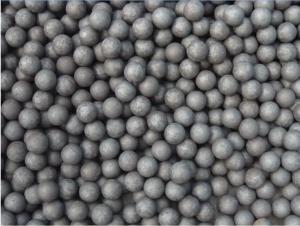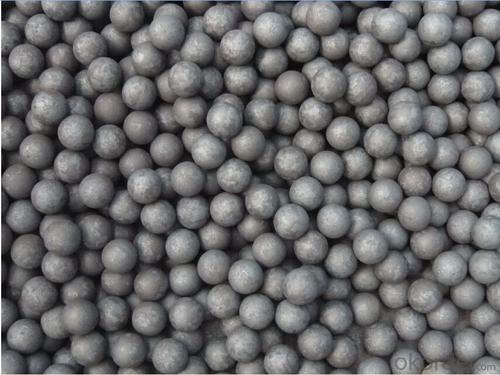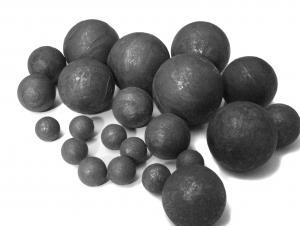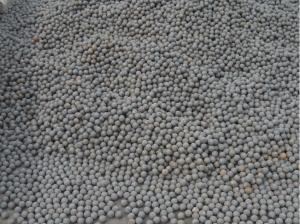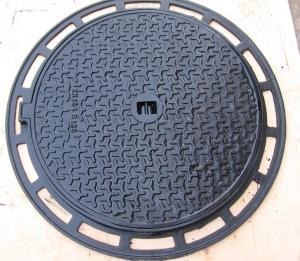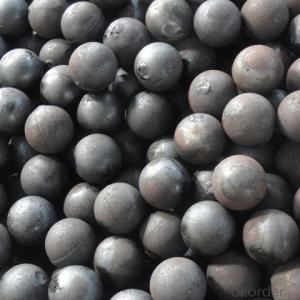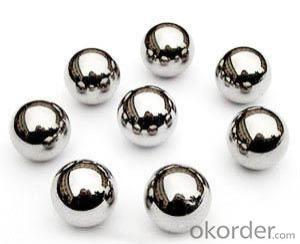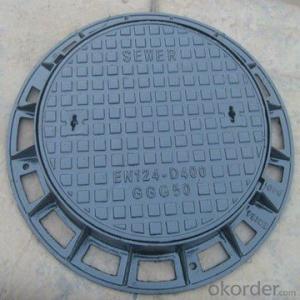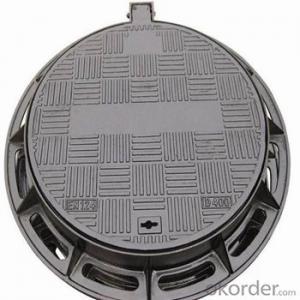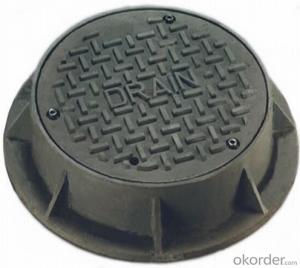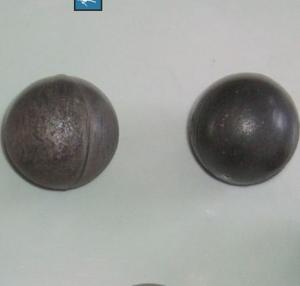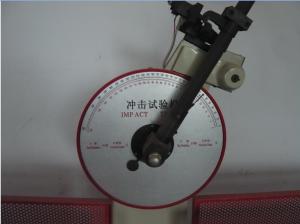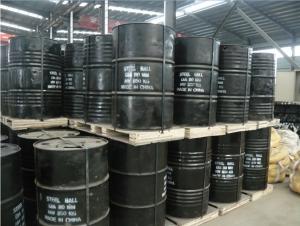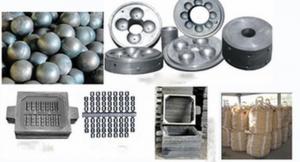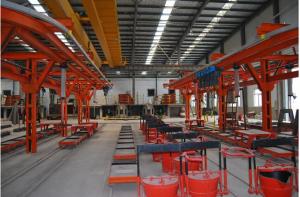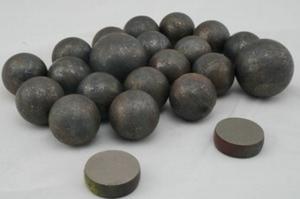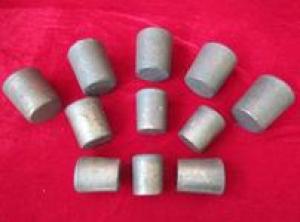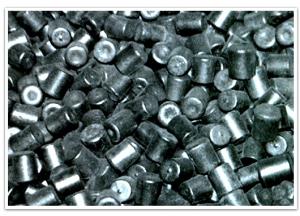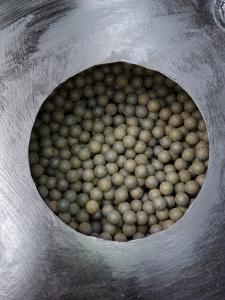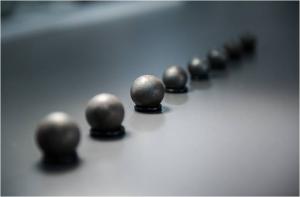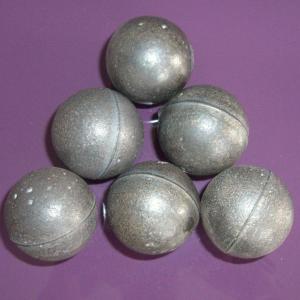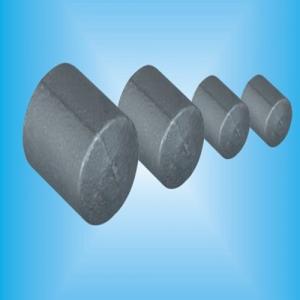High/Medium/Low Chrome Alloyed Cast Grinding Media Ball with High Quality ISO9001-2008
- Loading Port:
- Qingdao
- Payment Terms:
- TT or LC
- Min Order Qty:
- 25M.T. m.t.
- Supply Capability:
- 150,000M.T. m.t./month
OKorder Service Pledge
OKorder Financial Service
You Might Also Like
High/Medium/Low Chrome Alloyed Cast Grinding Media Ball with High Quality ISO9001-2008
1. Specifications for High/Medium/Low Chrome Alloyed Cast Grinding Media Ball with High Quality ISO9001-2008
a).Diameter: 20-150mm
b).Hardness: 45-65HRC
c)/Breakage Rate<0.5%
d).Drop Times>10000
e).Application: cement, metallurgy, mining, electric power, chemical and magnets industries.
f).Super High Chrome: 15-23% High Chrome: Cr=10-13% Medium Chrome: Cr=3-6% Low Chrome: Cr=0.8-1.8%
g).Characteristics: high hardness, good wear resistant, low breakage, no deformation.
2. Weight for High/Medium/Low Chrome Alloyed Cast Grinding Media Ball with High Quality ISO9001-2008
No. | Diameter (mm) | Weight of each (kg) | Pcs/ton |
1 | Ø20 | 0.0322 | 31056 |
2 | Ø25 | 0.063 | 15873 |
3 | Ø30 | 0.11 | 9091 |
4 | Ø40 | 0.257 | 3891 |
5 | Ø50 | 0.50 | 2000 |
6 | Ø60 | 0.867 | 1153 |
7 | Ø70 | 1.37 | 729 |
8 | Ø80 | 2.05 | 487 |
9 | Ø90 | 2.90 | 345 |
10 | Ø100 | 4.00 | 250 |
11 | Ø110 | 5.30 | 188 |
12 | Ø120 | 6.80 | 147 |
13 | Ø125 | 7.75 | 129 |
14 | Ø130 | 8.74 | 114 |
3. Detail Technical Data for High/Medium/Low Chrome Alloyed Cast Grinding Media Ball with High Quality ISO9001-2008
Mechanical properties:
Model | Mechanical properties | Microstructure | |
HRC | Times of falling (3.5m) | ||
Low Chromium | ≥45 | 8000 | P+C |
Medium Chromium | ≥50 | 8000 | P+C |
High Chromium | ≥56 | 8000 | M+C |
Chemical Composition:
Model | Chemical Composition | |||||
| | C | Si | Mn | Cr | P | S |
Low Chromium | 2.3-3.4 | ≤1.5 | 0.5-1.5 | 1.0-2.0 | ≤0.1 | ≤0.1 |
Medium Chromium | 2.2-2.8 | 0.5-1.0 | 0.5-0.8 | 10.0-12.0 | ≤0.1 | ≤0.1 |
High Chromium | 2.4-3.2 | 0.5-0.8 | 0.5-0.8 | 16.0-18.0 | ≤0.1 | ≤0.1 |
3. Packing for High/Medium/Low Chrome Alloyed Cast Grinding Media Ball with High Quality ISO9001-2008
Container Bag: Dia20mm-Dia150mm 1000Kgs/Container Bag (GWt:1002Kgs)
Steel Drums: Dia20mm-Dia80mm 900Kgs/Drum (GW: 915Kgs)
Dia90mm-Dia150mm 850Kgs/Drum (GW: 865Kg)
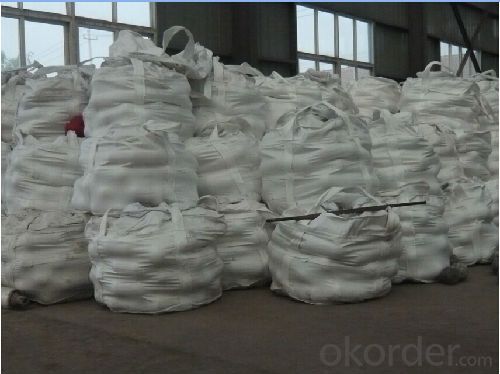
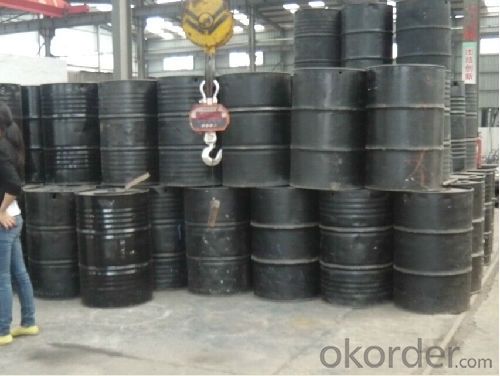
- Q: What's the effect of casting copper?
- Copper is one of the main corrosion resistant alloys. When the mass fraction of copper in cast iron is from 0.25% to 1%, the corrosion resistance of copper in the industrial atmosphere can be obviously increased. But copper has very little corrosion resistance in lye or salt solution.Copper can increase the flowability of molten iron and improve its casting ability remarkably.Copper can increase the coercive force and residual magnetic force, but the permeability is not affected.Combined use of copper with other alloy elements, such as copper chromium, copper chromium molybdenum, copper molybdenum, copper manganese, copper vanadium, can achieve greater results.
- Q: What is the reason for 304 stainless steel precision casting parts to be changed?
- Steel deformation control is one of the most common problems in the metal processing industry. Any process will occur. The casting is the largest deformation and the least fine. It is generally used to produce blank blanks
- Q: How much is the amount of electrophoretic paint per square meter used in the casting?
- It was a very simple question, and it was complicated by what you said.
- Q: What should I pay attention to when designing a casting structure?
- The basic structure of unit 3 in the design of metal casting casting and its parameters are selected, usually should also pay attention to: (1) because of the metal type heat quickly, so the metal type casting minimum wall thickness should be bigger than the sand casting casting casting; (2) the inner wall of the internal ribs and the thickness of a should be connected the outer wall thickness of 0.6 to 0.7, or as the inner wall (rib) cold slowly, cracks in the wall at the junction in the casting shrinkage; (3) to prevent generating white grey cast iron, in addition to taking measures in the process, must make the wall thickness is not too thin (some information that cast fillet at the corner of the wall thickness of 15mm or more, with metal casting casting must be in the corner, for Aluminum Alloy, metal casting magnesium alloy castings shall not be less than 3 ~ 4m; (4) because of the metal type and the core that, for To facilitate the extraction of castings and casting out type, slope casting should be suitably large than sand casting metal casting, the general should be 30% ~ 50%, it should be pointed out that in addition to the height of the slope of casting size and alloy type, wall, is also related to the casting surface position, where the cooling and contraction of the metal type the surface of casting surface can be designed from the tendency of small inclination, while casting shrinkage tend to be pressed on the surface of metal casting type should be given greater inclination.
- Q: How can the casting be quenched and tempered?
- Return, general castings (especially steel castings) commonly used heat treatment process is normalized and tempered. Of course there are completely by annealing or remove stress annealing...
- Q: How do you mark it on the drawing? Do you need to discuss it with the manufacturer?Because the casting allowance is the standard, then, after all, is the theoretical value, the actual level depends on the manufacturer, so is it necessary to ask the manufacturer?
- Casting parts do not need to provide drawings of casting blank, the casting factory according to your drawings in the required surface will be sufficient allowance, and the rest of the size according to the mechanical design manual and the casting manual can be found. The general foundry casting technology division will mark put shrinkage and the allowance of the map in your chart (usually with the red pen) for the production of wood or other material wood workers die drawings.
- Q: Cause of choking of casting parts
- Choke fire is the process of pouring a large number of gases can not be discharged smoothly, boiling in the metal liquid, resulting in a large number of castings in the pores, and even incomplete casting defects
- Q: We are small castings, the need for surface treatment of shot blasting machine, about how much?
- The choice of shot blasting machine, this is according to the workpiece size, yield, whether can collision, and the working time and other factors considered, while the price of different blasting machine are not the same, but the vast majority of small castings used crawler shot blasting machine, according to the comprehensive consideration of factors such as yield, size of workpiece commonly used on the market the crawler shot blasting machine has Q324, Q326, Q328, Q3210, and each time the amount of their treatment were 125KG, 200KG, 400KG, 600KG, the specific use of what types also need to be determined according to the actual situation
- Q: When the blank is a casting, the margin is evenly distributed, how should rough machining?Please help friends from mechanical classes.There is another problem: in the NC milling plane contour machining, when the rough margin is large, how to deal with.Who can help in time, add 20 reward. Urgently!!
- Personal advice:Because of the large margin, your outline is easy to guarantee;So the key is to consider the assembly and aesthetics of the casting. You have to find the machining criteria;Rough the datum so that it can be machined;After the outline, turn back to the finishing line.If the casting requirement is not high, the benchmark can be directly processed; (not recommended)Over
- Q: Lathe processing stainless steel casting parts to use what type of tool, the speed into the amount of how much tool angle
- What kind of work, what kind of material, 204201304316, how big live ah? You ask?Can the 201 pieces of material and 304 of the pieces fit in a single car? Can I use the universal YG8 knife? Straight, knife, pipe thread?You should live to say, understand, say, do not understand, draw a simple drawing with Baidu doodle, marking the important size, this is good to answer ah!
1. Manufacturer Overview
| Location | Zhangqiu, China |
| Year Established | 1995 |
| Annual Output Value | 150,000M.T. |
| Main Markets | 40%,South America; 30%,South Africa; 15%,Southeast Asia; 5%, Europe Area; 5%, North America; 5%, Other Areas |
| Company Certifications | ISO9001:2008;SGS Test Report |
2. Manufacturer Certificates
| a) Certification Name | |
| Range | |
| Reference | |
| Validity Period |
3. Manufacturer Capability
| a) Trade Capacity | |
| Nearest Port | Qingdao;Tianjin |
| Export Percentage | |
| No.of Employees in Trade Department | 25 |
| Language Spoken: | English, Chinese |
| b) Factory Information | |
| Factory Size: | 68,000m2 |
| No. of Production Lines | 15 |
| Contract Manufacturing | |
| Product Price Range | $700/M.T.-$1200/M.T. |
Send your message to us
High/Medium/Low Chrome Alloyed Cast Grinding Media Ball with High Quality ISO9001-2008
- Loading Port:
- Qingdao
- Payment Terms:
- TT or LC
- Min Order Qty:
- 25M.T. m.t.
- Supply Capability:
- 150,000M.T. m.t./month
OKorder Service Pledge
OKorder Financial Service
Similar products
Hot products
Hot Searches
Related keywords
